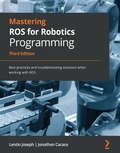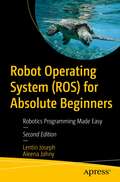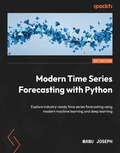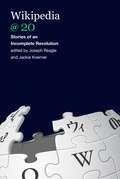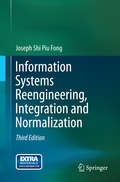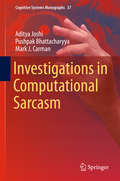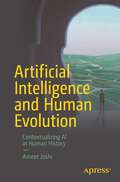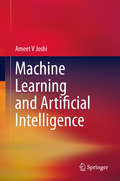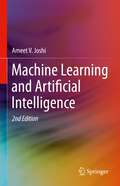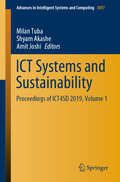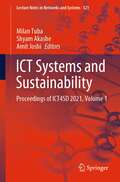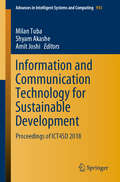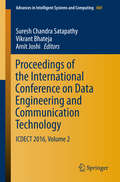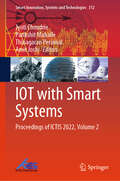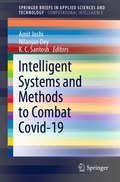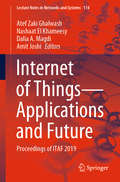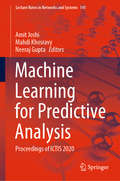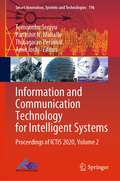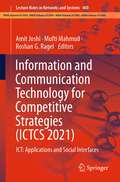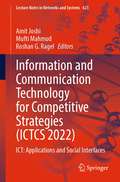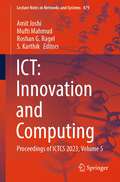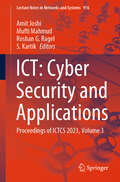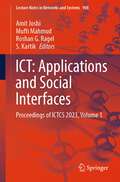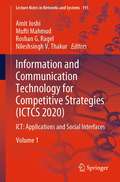- Table View
- List View
Mastering ROS for Robotics Programming: Best practices and troubleshooting solutions when working with ROS, 3rd Edition
by Lentin Joseph Jonathan CacaceDesign, build, and simulate complex robots using the Robot Operating SystemKey FeaturesBecome proficient in ROS programming using C++ with this comprehensive guideBuild complex robot applications using the ROS Noetic Ninjemys release to interface robot manipulators with mobile robotsLearn to interact with aerial robots using ROSBook DescriptionThe Robot Operating System (ROS) is a software framework used for programming complex robots. ROS enables you to develop software for building complex robots without writing code from scratch, saving valuable development time. Mastering ROS for Robotics Programming provides complete coverage of the advanced concepts using easy-to-understand, practical examples and step-by-step explanations of essential concepts that you can apply to your ROS robotics projects. The book begins by helping you get to grips with the basic concepts necessary for programming robots with ROS. You'll then discover how to develop a robot simulation, as well as an actual robot, and understand how to apply high-level capabilities such as navigation and manipulation from scratch. As you advance, you'll learn how to create ROS controllers and plugins and explore ROS's industrial applications and how it interacts with aerial robots. Finally, you'll discover best practices and methods for working with ROS efficiently. By the end of this ROS book, you'll have learned how to create various applications in ROS and build your first ROS robot.What you will learnCreate a robot model with a 7-DOF robotic arm and a differential wheeled mobile robotWork with Gazebo, CoppeliaSim, and Webots robotic simulatorsImplement autonomous navigation in differential drive robots using SLAM and AMCL packagesInteract with and simulate aerial robots using ROSExplore ROS pluginlib, ROS nodelets, and Gazebo pluginsInterface I/O boards such as Arduino, robot sensors, and high-end actuatorsSimulate and perform motion planning for an ABB robot and a universal arm using ROS-IndustrialWork with the motion planning features of a 7-DOF arm using MoveIt Who this book is forIf you are a robotics graduate, robotics researcher, or robotics software professional looking to work with ROS, this book is for you. Programmers who want to explore the advanced features of ROS will also find this book useful. Basic knowledge of ROS, GNU/Linux, and C++ programming concepts is necessary to get started with this book.
ROS Robotics Projects: Build and control robots powered by the Robot Operating System, machine learning, and virtual reality, 2nd Edition
by Lentin Joseph Ramkumar GandhinathanBuild exciting robotics projects such as mobile manipulators, self-driving cars, and industrial robots powered by ROS, machine learning, and virtual reality Key Features Create and program cool robotic projects using powerful ROS libraries Build industrial robots like mobile manipulators to handle complex tasks Learn how reinforcement learning and deep learning are used with ROS Book Description Nowadays, heavy industrial robots placed in workcells are being replaced by new age robots called cobots, which don't need workcells. They are used in manufacturing, retail, banks, energy, and healthcare, among other domains. One of the major reasons for this rapid growth in the robotics market is the introduction of an open source robotics framework called the Robot Operating System (ROS). This book covers projects in the latest ROS distribution, ROS Melodic Morenia with Ubuntu Bionic (18.04). Starting with the fundamentals, this updated edition of ROS Robotics Projects introduces you to ROS-2 and helps you understand how it is different from ROS-1. You'll be able to model and build an industrial mobile manipulator in ROS and simulate it in Gazebo 9. You'll then gain insights into handling complex robot applications using state machines and working with multiple robots at a time. This ROS book also introduces you to new and popular hardware such as Nvidia's Jetson Nano, Asus Tinker Board, and Beaglebone Black, and allows you to explore interfacing with ROS. You'll learn as you build interesting ROS projects such as self-driving cars, making use of deep learning, reinforcement learning, and other key AI concepts. By the end of the book, you'll have gained the confidence to build interesting and intricate projects with ROS. What you will learn Grasp the basics of ROS and understand ROS applications Uncover how ROS-2 is different from ROS-1 Handle complex robot tasks using state machines Communicate with multiple robots and collaborate to build apps with them Explore ROS capabilities with the latest embedded boards such as Tinker Board S and Jetson Nano Discover how machine learning and deep learning techniques are used with ROS Build a self-driving car powered by ROS Teleoperate your robot using Leap Motion and a VR headset Who this book is for If you're a student, hobbyist, professional, or anyone with a passion for learning robotics and interested in learning about algorithms, motion control, and perception capabilities from scratch, this book is for you. This book is also ideal for anyone who wants to build a new product and for researchers to make the most of what's already available to create something new and innovative in the field of robotics.
Robot Operating System (ROS) for Absolute Beginners: Robotics Programming Made Easy
by Lentin Joseph Aleena JohnyStart programming your own robots using Robot Operation System (ROS). Targeted for absolute beginners in ROS, Linux, and Python, this guide lets you build your own robotics projects. You'll learn the basic foundation of Ubuntu Linux. Begin with the fundamentals. Installation and useful commands will give you the basic tools you need while programming a robot. Then add useful software applications that can be used while making robots. Programming robots can be done using any of the programming languages. Most popular programming languages are Python and C++. You will incorporate the fundamentals of C++ by learning object oriented programing concepts from example and building C++ projects.Finally, tackle an ROS hands-on project to apply all the concepts of ROS you've learned. The aim of the project is to perform a dead-reckoning using a cheap mobile robot. You can command your robot's position on Rviz and your robot will move to that position! Not only will you learn to program, you'll gain hands-on experience working with hardware to create a real robot.What You’ll LearnInstall Ubuntu 20Install ROS NoeticUse ROS Programming with roscpp and rospy Build a mobile robot from scratch using ROSWho This Book Is ForRobotics enthusiast with little or no prior programming experience.
Modern Time Series Forecasting with Python: Explore industry-ready time series forecasting using modern machine learning and deep learning
by Manu JosephBuild real-world time series forecasting systems which scale to millions of time series by applying modern machine learning and deep learning conceptsKey FeaturesExplore industry-tested machine learning techniques used to forecast millions of time seriesGet started with the revolutionary paradigm of global forecasting modelsGet to grips with new concepts by applying them to real-world datasets of energy forecastingBook DescriptionWe live in a serendipitous era where the explosion in the quantum of data collected and a renewed interest in data-driven techniques such as machine learning (ML), has changed the landscape of analytics, and with it, time series forecasting. This book, filled with industry-tested tips and tricks, takes you beyond commonly used classical statistical methods such as ARIMA and introduces to you the latest techniques from the world of ML. This is a comprehensive guide to analyzing, visualizing, and creating state-of-the-art forecasting systems, complete with common topics such as ML and deep learning (DL) as well as rarely touched-upon topics such as global forecasting models, cross-validation strategies, and forecast metrics. You'll begin by exploring the basics of data handling, data visualization, and classical statistical methods before moving on to ML and DL models for time series forecasting. This book takes you on a hands-on journey in which you'll develop state-of-the-art ML (linear regression to gradient-boosted trees) and DL (feed-forward neural networks, LSTMs, and transformers) models on a real-world dataset along with exploring practical topics such as interpretability. By the end of this book, you'll be able to build world-class time series forecasting systems and tackle problems in the real world.What you will learnFind out how to manipulate and visualize time series data like a proSet strong baselines with popular models such as ARIMADiscover how time series forecasting can be cast as regressionEngineer features for machine learning models for forecastingExplore the exciting world of ensembling and stacking modelsGet to grips with the global forecasting paradigmUnderstand and apply state-of-the-art DL models such as N-BEATS and AutoformerExplore multi-step forecasting and cross-validation strategiesWho this book is forThe book is for data scientists, data analysts, machine learning engineers, and Python developers who want to build industry-ready time series models. Since the book explains most concepts from the ground up, basic proficiency in Python is all you need. Prior understanding of machine learning or forecasting will help speed up your learning. For experienced machine learning and forecasting practitioners, this book has a lot to offer in terms of advanced techniques and traversing the latest research frontiers in time series forecasting.
Wikipedia @ 20: Stories of an Incomplete Revolution
by Joseph Reagle and Jackie KoernerWikipedia's first twenty years: how what began as an experiment in collaboration became the world's most popular reference work.We have been looking things up in Wikipedia for twenty years. What began almost by accident--a wiki attached to an nascent online encyclopedia--has become the world's most popular reference work. Regarded at first as the scholarly equivalent of a Big Mac, Wikipedia is now known for its reliable sourcing and as a bastion of (mostly) reasoned interaction. How has Wikipedia, built on a model of radical collaboration, remained true to its original mission of "free access to the sum of all human knowledge" when other tech phenomena have devolved into advertising platforms? In this book, scholars, activists, and volunteers reflect on Wikipedia's first twenty years, revealing connections across disciplines and borders, languages and data, the professional and personal.
Information Systems Reengineering, Integration and Normalization
by Joseph Shi Piu FongTaking a very practical approach, the author describes in detail database conversion techniques, reverse engineering, forward engineering and re-engineering methodologies for information systems, offering a systematic software engineering approach for reusing existing database systems built with "old" technology. He demonstrates how the existing systems can be transformed into the new technologies with the preservation of semantic constraints and without loss of information. In this third edition, with a new chapter on Data Normalization the author shows once the databases have been converted, how to integrate them for consolidating information, and how to normalize them so that they are efficient and user friendly. Many examples, illustrations and case studies together with questions and answers ensure that the methodology is easy to follow. Ideal as a textbook for students studying information systems theories, Information Systems Reengineering Integration and Normalization will also be a valuable management reference book for Information Technology Practitioners. Additional material is available on www. extramaterials/978-3-319-12294-6
Investigations in Computational Sarcasm (Cognitive Systems Monographs #37)
by Aditya Joshi Pushpak Bhattacharyya Mark J. CarmanThis book describes the authors’ investigations of computational sarcasm based on the notion of incongruity. In addition, it provides a holistic view of past work in computational sarcasm and the challenges and opportunities that lie ahead. Sarcastic text is a peculiar form of sentiment expression and computational sarcasm refers to computational techniques that process sarcastic text. To first understand the phenomenon of sarcasm, three studies are conducted: (a) how is sarcasm annotation impacted when done by non-native annotators? (b) How is sarcasm annotation impacted when the task is to distinguish between sarcasm and irony? And (c) can targets of sarcasm be identified by humans and computers. Following these studies, the book proposes approaches for two research problems: sarcasm detection and sarcasm generation. To detect sarcasm, incongruity is captured in two ways: ‘intra-textual incongruity’ where the authors look at incongruity within the text to be classified (i.e., target text) and ‘context incongruity’ where the authors incorporate information outside the target text. These approaches use machine-learning techniques such as classifiers, topic models, sequence labelling, and word embeddings. These approaches operate at multiple levels: (a) sentiment incongruity (based on sentiment mixtures), (b) semantic incongruity (based on word embedding distance), (c) language model incongruity (based on unexpected language model), (d) author’s historical context (based on past text by the author), and (e) conversational context (based on cues from the conversation). In the second part of the book, the authors present the first known technique for sarcasm generation, which uses a template-based approach to generate a sarcastic response to user input. This book will prove to be a valuable resource for researchers working on sentiment analysis, especially as applied to automation in social media.
Artificial Intelligence and Human Evolution: Contextualizing AI in Human History
by Ameet JoshiThis book explores, from a high level, the parallels between the evolution of humans and the evolution of machines. The book reviews practical questions about the future of AI but also engages in philosophical discussions about what machine intelligence could mean for the human experience.The book focuses on what is intelligence and what separates intelligent species from non-so-intelligent ones. It concludes this section with the description of true nature of humanintelligence can be. We discuss how we looked at machines few hundred years back and how their definition and the expectations from them has changed over time. We will consider when and how machines became intelligent and then explore in depth he latest developments in artificial intelligence with explanation of deep learning technology and humanlike chat interface provided with products like ChatGPT. We will define both human intelligence and artificial intelligence and the distinction between the two.In the third and final section of the book, we will focus on near- and longer-term futures with widespread use of machine intelligence, making the whole ambient environment that we will live in intelligent How is this going to change human lives, and what parts of human life will be encroached with machines and their intelligence? We will explore how the job market will look with some jobs being taken by machines, and if this is overall a positive or negative change. What You Will LearnHow human intelligence is connected with artificial intelligence as well as the differencesHow AI is going to change our lives in the coming years, decades and centuriesAn explanation of deep learning technology and humanlike chat interface provided with products like ChatGPTWho This Book is ForReaders looking to contextualize the evolution of artificial intelligence in human history
Machine Learning and Artificial Intelligence
by Ameet V JoshiThis book provides comprehensive coverage of combined Artificial Intelligence (AI) and Machine Learning (ML) theory and applications. Rather than looking at the field from only a theoretical or only a practical perspective, this book unifies both perspectives to give holistic understanding. The first part introduces the concepts of AI and ML and their origin and current state. The second and third parts delve into conceptual and theoretic aspects of static and dynamic ML techniques. The forth part describes the practical applications where presented techniques can be applied. The fifth part introduces the user to some of the implementation strategies for solving real life ML problems. The book is appropriate for students in graduate and upper undergraduate courses in addition to researchers and professionals. It makes minimal use of mathematics to make the topics more intuitive and accessible.Presents a full reference to artificial intelligence and machine learning techniques - in theory and application;Provides a guide to AI and ML with minimal use of mathematics to make the topics more intuitive and accessible;Connects all ML and AI techniques to applications and introduces implementations.
Machine Learning and Artificial Intelligence
by Ameet V JoshiThe new edition of this popular professional book on artificial intelligence (ML) and machine learning (ML) has been revised for classroom or training use. The new edition provides comprehensive coverage of combined AI and ML theory and applications. Rather than looking at the field from only a theoretical or only a practical perspective, this book unifies both perspectives to give holistic understanding. The first part introduces the concepts of AI and ML and their origin and current state. The second and third parts delve into conceptual and theoretic aspects of static and dynamic ML techniques. The fourth part describes the practical applications where presented techniques can be applied. The fifth part introduces the user to some of the implementation strategies for solving real life ML problems. Each chapter is accompanied with a set of exercises that will help the reader / student to apply the learnings from the chapter to a real-life problem. Completion of these exercises will help the reader / student to solidify the concepts learned. The book is appropriate for students in graduate and upper undergraduate courses in addition to researchers and professionals. It makes minimal use of mathematics to make the topics more intuitive and accessible. The book covers a large gamut of topics in the area of AI and ML and a professor can tailor a course on AI / ML based on the book by selecting and re-organizing the sequence of chapters to suit the needs.
ICT Systems and Sustainability: Proceedings of ICT4SD 2019, Volume 1 (Advances in Intelligent Systems and Computing #1077)
by Amit Joshi Shyam Akashe Milan TubaThis book proposes new technologies and discusses future solutions for ICT design infrastructures, as reflected in high-quality papers presented at the 4th International Conference on ICT for Sustainable Development (ICT4SD 2019), held in Goa, India, on 5–6 July 2019. The conference provided a valuable forum for cutting-edge research discussions among pioneering researchers, scientists, industrial engineers, and students from all around the world. Bringing together experts from different countries, the book explores a range of central issues from an international perspective.
ICT Systems and Sustainability: Proceedings of ICT4SD 2021, Volume 1 (Lecture Notes in Networks and Systems #321)
by Amit Joshi Shyam Akashe Milan TubaThis book proposes new technologies and discusses future solutions for ICT design infrastructures, as reflected in high-quality papers presented at the 6th International Conference on ICT for Sustainable Development (ICT4SD 2021), held in Goa, India, on 5–6 August 2021. The book covers the topics such as big data and data mining, data fusion, IoT programming toolkits and frameworks, green communication systems and network, use of ICT in smart cities, sensor networks and embedded system, network and information security, wireless and optical networks, security, trust, and privacy, routing and control protocols, cognitive radio and networks, and natural language processing. Bringing together experts from different countries, the book explores a range of central issues from an international perspective.
Information and Communication Technology for Sustainable Development: Proceedings of ICT4SD 2018 (Advances in Intelligent Systems and Computing #933)
by Amit Joshi Shyam Akashe Milan TubaThe book proposes new technologies and discusses future solutions for ICT design infrastructures, and includes high-quality submissions presented at the Third International Conference on ICT for Sustainable Development (ICT4SD 2018), held in Goa, India on 30–31 August 2018. The conference stimulated cutting-edge research discussions among pioneering researchers, scientists, industrial engineers, and students from all around the world. Bringing together experts from different countries, the book focuses on innovative issues at an international level.
Proceedings of the International Conference on Data Engineering and Communication Technology
by Amit Joshi Vikrant Bhateja Suresh Chandra SatapathyThis two-volume book contains research work presented at the First International Conference on Data Engineering and Communication Technology (ICDECT) held during March 10-11, 2016 at Lavasa, Pune, Maharashtra, India. The book discusses recent research technologies and applications in the field of Computer Science, Electrical and Electronics Engineering. The aim of the Proceedings is to provide cutting-edge developments taking place in the field data engineering and communication technologies which will assist the researchers and practitioners from both academia as well as industry to advance their field of study.
IOT with Smart Systems: Proceedings of ICTIS 2022, Volume 2 (Smart Innovation, Systems and Technologies #312)
by Amit Joshi Jyoti Choudrie Parikshit Mahalle Thinagaran PerumalThis book gathers papers addressing state-of-the-art research in all areas of information and communication technologies and their applications in intelligent computing, cloud storage, data mining and software analysis. It presents the outcomes of the Sixth International Conference on Information and Communication Technology for Intelligent Systems (ICTIS 2022), held in Ahmedabad, India. The book is divided into two volumes. It discusses the fundamentals of various data analysis techniques and algorithms, making it a valuable resource for researchers and practitioners alike.
Intelligent Systems and Methods to Combat Covid-19 (SpringerBriefs in Applied Sciences and Technology)
by Amit Joshi Nilanjan Dey K. C. SantoshThis book discusses intelligent systems and methods to prevent further spread of COVID-19, including artificial intelligence, machine learning, computer vision, signal processing, pattern recognition, and robotics. It not only explores detection/screening of COVID-19 positive cases using one type of data, such as radiological imaging data, but also examines how data analytics-based tools can help predict/project future pandemics. In addition, it highlights various challenges and opportunities, like social distancing, and addresses issues such as data collection, privacy, and security, which affect the robustness of AI-driven tools. Also investigating data-analytics-based tools for projections using time series data, pattern analysis tools for unusual pattern discovery (anomaly detection) in image data, as well as AI-enabled robotics and its possible uses, the book will appeal to a broad readership, including academics, researchers and industry professionals.
Internet of Things—Applications and Future: Proceedings of ITAF 2019 (Lecture Notes in Networks and Systems #114)
by Amit Joshi Atef Zaki Ghalwash Nashaat El Khameesy Dalia A. MagdiThis book is a collection of the best research papers presented at the First World Conference on Internet of Things: Applications & Future (ITAF 2019), Sponsored by GR Foundation and French University in Egypt, held at Triumph Luxury Hotel, Cairo, Egypt, on 14–15 October 2019. It includes innovative works from leading researchers, innovators, business executives, and industry professionals that cover the latest advances in and applications for commercial and industrial end users across sectors within the emerging Internet of Things ecosphere. It addresses both current and emerging topics related to the Internet of Things such as big data research, new services and analytics, Internet of Things (IoT) fundamentals, electronic computation and analysis, big data for multi-discipline services, security, privacy and trust, IoT technologies, and open and cloud technologies.
Machine Learning for Predictive Analysis: Proceedings of ICTIS 2020 (Lecture Notes in Networks and Systems #141)
by Amit Joshi Mahdi Khosravy Neeraj GuptaThis book gathers papers addressing state-of-the-art research in the areas of machine learning and predictive analysis, presented virtually at the Fourth International Conference on Information and Communication Technology for Intelligent Systems (ICTIS 2020), India. It covers topics such as intelligent agent and multi-agent systems in various domains, machine learning, intelligent information retrieval and business intelligence, intelligent information system development using design science principles, intelligent web mining and knowledge discovery systems.
Information and Communication Technology for Intelligent Systems: Proceedings of ICTIS 2020, Volume 2 (Smart Innovation, Systems and Technologies #196)
by Amit Joshi Parikshit N. Mahalle Tomonobu Senjyu Thinagaran PerumalThis book gathers papers addressing state-of-the-art research in all areas of information and communication technologies and their applications in intelligent computing, cloud storage, data mining and software analysis. It presents the outcomes of the Fourth International Conference on Information and Communication Technology for Intelligent Systems, which was held in Ahmedabad, India. Divided into two volumes, the book discusses the fundamentals of various data analysis techniques and algorithms, making it a valuable resource for researchers and practitioners alike.
Information and Communication Technology for Competitive Strategies: ICT: Applications and Social Interfaces (Lecture Notes in Networks and Systems #400)
by Amit Joshi Mufti Mahmud Roshan G. RagelThis book contains best selected research papers presented at ICTCS 2021: Sixth International Conference on Information and Communication Technology for Competitive Strategies. The conference will be held at Jaipur, Rajasthan, India, during December 17–18, 2021. The book covers state-of-the-art as well as emerging topics pertaining to ICT and effective strategies for its implementation for engineering and managerial applications. This book contains papers mainly focused on ICT for computation, algorithms and data analytics, and IT security. The book is presented in two volumes.
Information and Communication Technology for Competitive Strategies: ICT: Applications and Social Interfaces (Lecture Notes in Networks and Systems #623)
by Amit Joshi Mufti Mahmud Roshan G. RagelThis book contains best selected research papers presented at ICTCS 2022: Seventh International Conference on Information and Communication Technology for Competitive Strategies. The conference will be held in Chandigarh, India during 9 – 10 December 2022. The book covers state-of-the-art as well as emerging topics pertaining to ICT and effective strategies for its implementation for engineering and managerial applications. This book contains papers mainly focused on ICT for computation, algorithms and data analytics and IT security. The work is presented in two volumes.
ICT: Proceedings of ICTCS 2023, Volume 5 (Lecture Notes in Networks and Systems #879)
by Amit Joshi Mufti Mahmud Roshan G. Ragel S. KarthikThis book contains best selected research papers presented at ICTCS 2023: Eighth International Conference on Information and Communication Technology for Competitive Strategies. The conference will be held in Jaipur, India during 8 – 9 December 2023. The book covers state-of-the-art as well as emerging topics pertaining to ICT and effective strategies for its implementation for engineering and managerial applications. This book contains papers mainly focused on ICT for computation, algorithms and data analytics and IT security. The work is presented in five volumes.
ICT: Proceedings of ICTCS 2023, Volume 3 (Lecture Notes in Networks and Systems #916)
by Amit Joshi Mufti Mahmud Roshan G. Ragel S. KartikThis book contains best selected research papers presented at ICTCS 2023: Eighth International Conference on Information and Communication Technology for Competitive Strategies. The conference will be held in Jaipur, India during 8 – 9 December 2023. The book covers state-of-the-art as well as emerging topics pertaining to ICT and effective strategies for its implementation for engineering and managerial applications. This book contains papers mainly focused on ICT for computation, algorithms and data analytics and IT security. The work is presented in three volumes.
ICT: Proceedings of ICTCS 2023, Volume 1 (Lecture Notes in Networks and Systems #908)
by Amit Joshi Mufti Mahmud Roshan G. Ragel S. KartikThis book contains best selected research papers presented at ICTCS 2023: Eighth International Conference on Information and Communication Technology for Competitive Strategies. The conference will be held in Jaipur, India during 8 – 9 December 2023. The book covers state-of-the-art as well as emerging topics pertaining to ICT and effective strategies for its implementation for engineering and managerial applications. This book contains papers mainly focused on ICT for computation, algorithms and data analytics and IT security. The work is presented in five volumes
Information and Communication Technology for Competitive Strategies: ICT: Applications and Social Interfaces (Lecture Notes in Networks and Systems #191)
by Amit Joshi Mufti Mahmud Roshan G. Ragel Nileshsingh V. ThakurThis book contains the best selected research papers presented at ICTCS 2020: Fifth International Conference on Information and Communication Technology for Competitive Strategies. The conference was held at Jaipur, Rajasthan, India, during 11–12 December 2020. The book covers state-of-the-art as well as emerging topics pertaining to ICT and effective strategies for its implementation for engineering and managerial applications. This book contains papers mainly focused on ICT for computation, algorithms and data analytics, and IT security.
